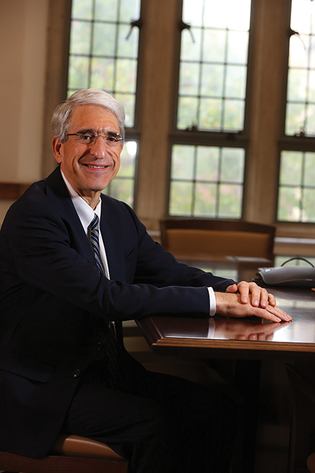
Mark Ostow
Dear Friends,
One of the great joys of calling a long-established global education and research institution like Yale “home” is the number of historic milestones we celebrate. The new academic year marks a very special one: the bicentennial of Yale Divinity School.
At the Divinity School’s convocation in August, I stood with the students who would usher YDS into its remarkable third century. In my speech to them, I reminded them of the school’s history and how it was in fact founded by students just like them. The Divinity School’s story formally begins 200 years ago, in 1822, when fifteen Yale College students petitioned to continue their theological studies. This led to a funding campaign to establish a “Theological Department.” The new entity was born, and it became known as the leader of the “New Haven theology,” a revised Calvinist alternative to an old orthodoxy. YDS is rooted in a pioneering spirit, and I have particular admiration for the ways it has pushed the boundaries of progress during the last two centuries.
Of course, the school has grown since 1822. In its first decades, YDS was known for educating ministers who went on to lead New England churches or serve elsewhere as teachers, missionaries, and pastors. Today, the school’s student body and faculty come from every walk of life and serve all sectors of society. Its influence is global, and its students pursue an array of scholarly and professional aims.
Over the past two hundred years, YDS has evolved. One example is the inclusion of women at YDS. The school began accepting women into its Bachelor of Divinity degree program in 1932. In 1989, M. Shawn Copeland was hired as the first Black woman on the full-time faculty, and in 2001, Rebecca Chopp was appointed the first woman dean of YDS. By 2019, women tenure-track faculty members outnumbered men.
Dean Greg Sterling has prioritized an examination of the school’s efforts to address injustice and inequality, while advancing the school’s mission “to foster the knowledge and love of God through scholarly engagement with Christian traditions in a global, multifaith context.” Over the past decade, eleven of the twenty tenure-track hires have come from underrepresented groups. In 2021, he appointed Lynn Sullivan-Harmon as associate dean for diversity, equity, and inclusion. The school also set aside $20 million in endowment to provide scholarships to incoming students who are dedicated to work on social justice within the traditions of a theological education, among other important efforts.
In addition to focusing on pressing social challenges, YDS is leading at Yale and nationally in addressing climate change. In 2006, in response to increasing awareness of global warming, YDS and the Yale School of the Environment forged a pioneering joint-degree program. In 2016, YDS committed to funding the world’s first large-scale sustainable campus student residence. The school’s Living Village, a complex that will house Divinity School students, will be powered by renewable energy, rely on sustainable water use practices, treat its own waste, and supply surplus solar power to other buildings. Supporters George and Carol Bauer and their family have generously led a philanthropic effort to raise the more than $150 million needed for both phases of this project. Groundbreaking is scheduled for January 2023, and phase one of the Living Village will open in August 2024.
As Yale’s president, I have prioritized access to a Yale education. I am grateful that we were able to announce last January that a combination of fundraising success and endowment performance will make it possible for YDS to meet the full tuition need of all students receiving financial aid. In addition, the school will provide a small stipend for all students with demonstrated need, beginning this academic year.
For these and so many other reasons, I am thrilled to congratulate the YDS community on reaching this bicentennial milestone. The school has played a vital role in shaping our campus and communities across the world. I know that our future will be brighter, more peaceful, and more compassionate because
of the knowledge and wisdom YDS faculty, graduates, students, and staff will continue to contribute to society.
With my warmest wishes,
Peter Salovey ’86PhD
President
Chris Argyris Professor of Psychology
 loading
loading